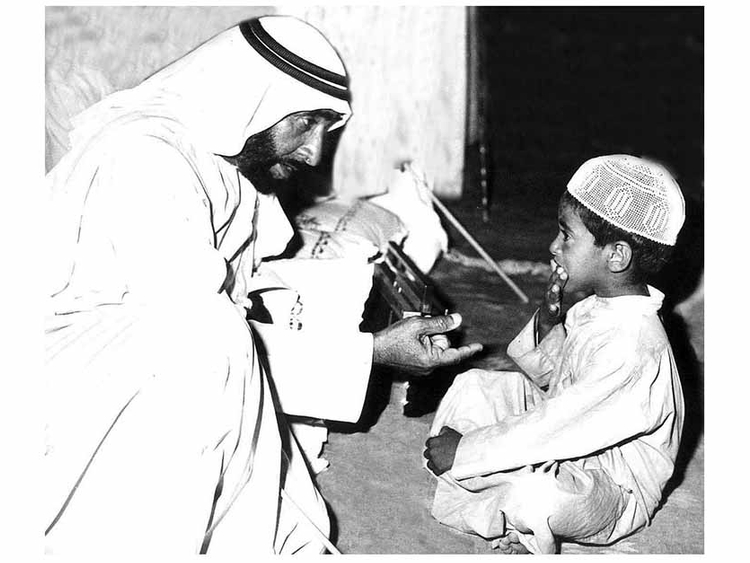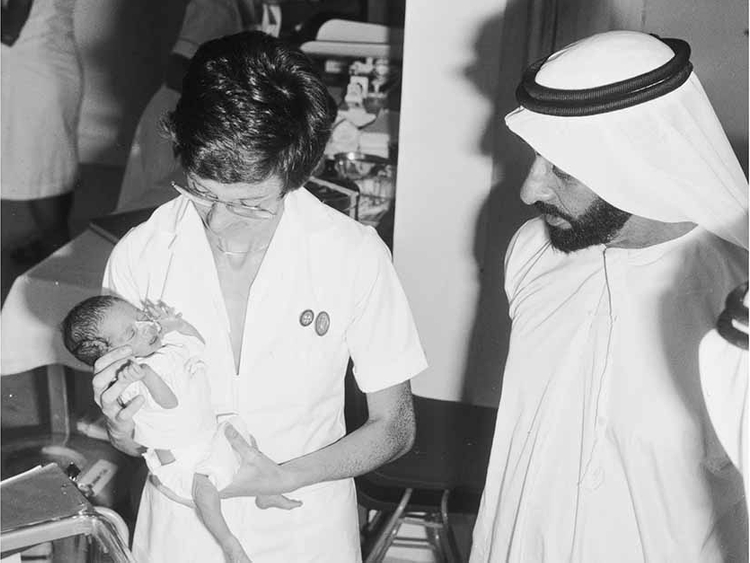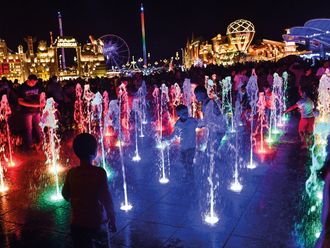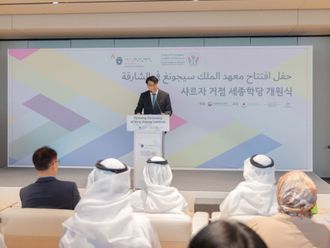The UAE is an impressive 21st-century nation, and has earned a unique place in the world through far-sighted social and political vision, and careful husbanding of its oil revenues. But this natural ascendancy could not have been taken for granted in the nation’s earliest years, and owes a substantial debt to the leadership and dedication of its first president, Shaikh Zayed Bin Sultan Al Nahyan.
When Shaikh Zayed took over as Ruler of Abu Dhabi from his brother Shaikh Shakhbout in August 1966, he had already been an integral part of the emirate’s government as Rulers’ Representative in Al Ain, and combined his experience with a clear vision of how he wanted to modernise the state. He was also gifted with the ability to find the right people to turn his ambitious and far-ranging plans into reality, and upon accession, began the process of setting up a new government for the rapidly changing country.
The first seeds of the UAE’s modern governance were sown as he moved from the traditional structure of decision-making in the Ruler’s majlis to a more formal series of government ministries with specific responsibilities and accountability. Shaikh Zayed’s visionary ideas from that pre-UAE era include the establishment of a government institution to handle the surpluses from the emirate’s steadily growing oil revenues, which he insisted be held in reserve for future generations, and for decades to come.
The success of this idea can be seen in the meteoric rise of the Abu Dhabi Investment Authority (ADIA), which is now ranked as one of the world’s largest sovereign wealth funds.
Documentarians regularly compile assorted lists of the most significant milestones in the history of the UAE, and their principal covenant is the role that Shaikh Zayed played in bringing together what was then a collection of tribal fiefdoms in a political union. When London declared the resident British forces would leave the Trucial States of the Gulf by 1971, it was Shaikh Zayed who campaigned to unite the nine emirates formerly under British protection. Qatar and Bahrain would end up choosing to go their own way, leaving him with seven remaining emirates to unite — which he did with grace, gusto and a large measure of gumption.
December 2, 1971 saw the formation of the UAE as a new nation. Though a period of uncertainty — and great fear — about its survival followed, due to regional strife and conflicts, reality proved dramatically different as the federation he created from careful negotiation alongside Shaikh Rashid Bin Saeed Al Maktoum of Dubai sealed a firm pact of peace and cooperation in one of the world’s most volatile neighbourhoods. Led by their policies, the federation has thrived and prospered, and achieved impressive levels of stability.
In dealing wisely with the disparities and disputes that emerged at the start, Shaikh Zayed not only augured a deepening of the state of the union, but carried it through to an advanced stage where the seven emirates now share so many common interests and such a solid grounding as to make it inseparable. Even the most casual observer of politics will find it hard to miss the greatness of character that defined Shaikh Zayed Bin Sultan Al Nahyan as the founder and first president of the UAE.
Creating a country out of thin air — or sand — is never an easy task and requires both development essentials and extraordinary efforts. Yet, it seemed almost effortless to Shaikh Zayed, earning him a place in history as one of the great founding fathers of the world.
Travelling abroad in the 1950s, he was inspired by the cities of Switzerland, Europe, India and the US, and wanted the same for his people. Shaikh Zayed linked modernity with the comfort and well-being of citizens, frequently saying, “Money not harnessed for serving the country and its people is not good.”
“When Shaikh Zayed started building this country, he did not do anything for himself, he did it for others.” says Mohammad Rashid Sulaiman Al Naqbi, an agriculture specialist based in Abu Dhabi. “He never built anything for himself. There is nothing that belongs to his name, it has all been for the country.”
Over the three decades of his rule, Shaikh Zayed tirelessly invested in his country, overseeing the establishment of various ministries, and diverse facets of public welfare. He placed great emphasis on education and empowerment, on inclusiveness, and on the protection of natural resources. He instructed authorities to facilitate education, paved the way for international scholarships, and ordered the establishment of the UAE University.
Shaikh Zayed was particularly concerned with expediting infrastructure, the basis of all development, often visiting construction sites in person. He brought in multinational experts and superintended a variety of nationwide development projects — schools, hospitals, ports, airports, road networks and grids for electricity and water, all of which formed the foundation for projects in other sectors. These were supported by directives to strengthen domains such as culture, media, sports, social affairs and laws to guarantee the rights of nationals and expatriates, workers and investors.
A man of the people, the president understood that to build unity and solidarity, he first needed to engender trust, and his legendary visits to local communities are still the subject of lore. “Shaikh Zayed was not a man who just made decisions, he made sure that everything he proposed happened on the ground,” says Al Naqbi. “When he wanted something done, he visited it himself until he saw it fulfilled.”
Throughout his 33-year rule, he reiterated the rewards of long-term vision, diligent work and unbiased generosity in the path to progress. “So much has been already said and written about our beloved Shaikh Zayed. And yet, it does not capture everything he set out to do for our country, and all he did on our behalf and for our benefit,” says senior federal government executive Saeed Al Baswedian.
“Blessed with far-seeing vision and great purposefulness, his selfless love and legendary sense of unity and equality made him an extraordinary man and wise ruler.”
In a ranking of Shaikh Zayed’s many achievements, it is economic diversity that is perhaps the greatest. “Future generations will be living in a world that is very different from that to which we are accustomed,” he said. “It is essential that we prepare ourselves and our children for that new world.” Today, the composition of the UAE’s GDP has been changed towards the dominance of the non-oil sector.
Thirteen years after his passing, Shaikh Zayed’s legacy remains the guiding spirit of his country, and the socio-economic shift he stimulated continues to inspire every aspect of its progress.
“The empowerment of UAE women started a long time ago, with Shaikh Zayed,” observes Belgian-born banking professional Nadia Boumeziout, now a UAE national. “What a visionary he was to state, so long ago, that woman is half of society, that any country which pursues development should not leave her in poverty or illiteracy.”
The UAE’s women, who enjoyed Shaikh Zayed’s wholehearted support, can be seen playing prominent and pivotal roles in the political, social and economic spheres. In 2004, a day before Shaikh Zayed died, Shaikha Lubna Al Qasimi was appointed Minister of Economy. The first woman to hold a ministerial position in the UAE inspired several women to become similarly active in the political process through memberships in the Cabinet and various consultative and legislative bodies. “My respect and admiration also extend to his wife, HH Shaikha Fatima Bint Mubarak, who continues his great work in supporting women’s rights,” adds Boumeziout.
Shaikh Zayed was held in high regard by Arab leaders, and often invited to act as a mediator. Building on this, he laid the foundations of a foreign policy defined by balance, moderation, cooperation, unstinting support for justice, and a language of peaceful dialogue. This balanced policy is now a hallmark of the UAE’s soft power.
A humanitarian and philanthropist, he sponsored a number of charities and causes across the world, again setting up an enduring legacy. In April the UAE was ranked the world’s top aid donor as compared to its wealth for the third consecutive year by the Organisation for Economic Co-operation and Development. The nation spent Dh15.23 billion on development assistance in 2016.
In 1995, when the WWF presented the Golden Panda to Shaikh Zayed, it was the first time its highest conservation award had been given to a head of state. Three years later, when the UAE marked its first Environment Day in February 1998, Shaikh Zayed reiterated his beliefs: “We shall continue to work to protect our environment and our wildlife. It is a duty, and, if we fail, our children, rightly, will reproach us for squandering an essential part of their inheritance, and of our heritage.”
He created sanctuaries for endangered species, programmes to protect wildlife, and institutions that continue to lead efforts at environmental protection. In a recent initiative, 14 endangered Arabian Oryx were released into the wild at the Qasr Al Sarab Protected Area, around 200km from Abu Dhabi. One of Shaikh Zayed’s favourite causes was what he called the greening of the desert through desert agriculture, evidence of which can be seen in the UAE’s burgeoning date plantations and organic farms.
The Emiratisation drive that is at the fore of corporate life today also stems from Shaikh Zayed’s mission to empower the Emirati individual.
That said, he saw every single resident of the UAE as instrumental to the country’s collective success. This philosophy remains alive in the words of a 13-year-old Indian, Nicole D’Souza, who is currently studying world leaders at her school. “Shaikh Zayed is the most tolerant world leader I know of, and this allows us expatriates to live here in harmony and security. Thanks to this great man, I was born in Dubai, attend school in Abu Dhabi, and the UAE is my home. Am I not lucky?”














